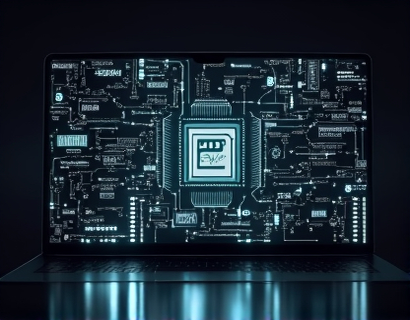Mastering Anonymous Operations: Cutting-Edge Pseudonym Software for Enhanced Privacy in Blockchain and AI
In the rapidly evolving landscape of technology, the need for enhanced digital privacy has become paramount, especially in the realms of blockchain and artificial intelligence. As more individuals and organizations engage with these technologies, the importance of maintaining anonymity and securing digital identities cannot be overstated. This article delves into the world of pseudonym software, designed to create and manage secure pseudonyms for blockchain and AI operations, ensuring compliance with regulatory standards while providing seamless and secure digital experiences.
The concept of using pseudonyms in digital transactions and interactions is not new, but the integration of this practice with advanced technologies like blockchain and AI is revolutionizing the way we approach digital privacy. Pseudonyms serve as a layer of separation between an individual's real identity and their online activities, offering a balance between anonymity and accountability. In the context of blockchain, where transactions are recorded on a public ledger, pseudonyms play a crucial role in protecting user privacy while still allowing for traceability when necessary.
One of the key challenges in blockchain and AI is ensuring that users can operate anonymously without compromising the integrity and security of the system. This is where cutting-edge pseudonym software comes into play. These solutions are expertly designed to create and manage secure pseudonyms, enabling users to engage in digital transactions and interactions with enhanced privacy. The software is built with a deep understanding of both blockchain mechanics and AI algorithms, ensuring that it meets the unique requirements of these technologies.
Understanding Pseudonyms in Blockchain
In blockchain, a pseudonym is essentially a unique identifier that replaces a user's real identity. This pseudonym is used to track transactions and interactions on the blockchain, but it does not directly reveal the user's real-world identity. The use of pseudonyms in blockchain provides several benefits, including enhanced privacy, reduced risk of identity theft, and compliance with data protection regulations.
For instance, in decentralized finance (DeFi) applications, users can interact with smart contracts using pseudonyms, ensuring that their financial activities remain private. This is particularly important in jurisdictions with strict privacy laws, such as the General Data Protection Regulation (GDPR) in the European Union. By using pseudonyms, users can comply with these regulations while still enjoying the benefits of blockchain technology.
Enhancing Privacy with Pseudonym Software
The pseudonym software solutions available today offer a range of features designed to enhance privacy and security. These include advanced cryptographic techniques, dynamic pseudonym generation, and real-time monitoring of digital footprints. Here are some of the key features that make these solutions effective:
- Advanced Cryptography: Utilizing state-of-the-art cryptographic algorithms, the software ensures that pseudonyms are securely generated and managed. This includes the use of public-key infrastructure (PKI) and zero-knowledge proofs, which allow for verification without revealing sensitive information.
- Dynamic Pseudonym Generation: The software can generate new pseudonyms on-the-fly, reducing the risk of linkability between different transactions. This dynamic approach makes it difficult for adversaries to trace a user's activities over time.
- Real-Time Monitoring: The platform continuously monitors the blockchain for any potential breaches or anomalies related to the user's pseudonym. This proactive approach helps in quickly identifying and mitigating risks.
- Compliance Management: The software is designed to help users comply with various regulatory standards, such as GDPR, KYC (Know Your Customer), and AML (Anti-Money Laundering). It provides tools to manage consent, data retention, and reporting requirements.
Integration with AI Systems
AI technologies, particularly those involving machine learning and natural language processing, also benefit from the use of pseudonyms. In AI-driven applications, user data is often collected and analyzed to improve services and personalize experiences. However, this data collection can pose significant privacy risks. Pseudonym software can bridge this gap by allowing AI systems to operate on anonymized data while still providing valuable insights.
For example, in healthcare AI applications, patient data can be pseudonymized before being fed into machine learning models. This ensures that individual patient information remains confidential, while the AI can still learn from the data to improve diagnostic accuracy or treatment recommendations. Similarly, in marketing and customer service, pseudonyms can be used to create user profiles that enhance personalization without compromising personal privacy.
Benefits of Using Pseudonym Software
The adoption of pseudonym software offers numerous benefits for tech-savvy individuals and organizations operating in the blockchain and AI spaces. Some of the key advantages include:
- Enhanced Privacy: By using pseudonyms, users can conduct their digital activities without exposing their real identities, reducing the risk of surveillance and data breaches.
- Regulatory Compliance: The software helps users meet various regulatory requirements, ensuring that their operations are lawful and transparent.
- Increased Security: Advanced security features protect against unauthorized access and potential attacks, safeguarding user data and transactions.
- Flexibility and Control: Users have greater control over their digital identities, allowing them to manage their privacy settings and choose when to reveal their true identities.
- Seamless Integration: The software is designed to integrate smoothly with existing blockchain and AI systems, minimizing disruptions and maximizing efficiency.
Case Studies and Real-World Applications
To better understand the practical applications of pseudonym software, let's look at a few real-world scenarios:
Case Study 1: Decentralized Finance (DeFi)
In the DeFi space, a user named Alex wanted to lend cryptocurrency without revealing his real identity. By using pseudonym software, Alex created a unique pseudonym for his wallet address. This pseudonym allowed him to borrow funds from a decentralized lending platform while keeping his identity hidden. The platform ensured that all transactions were recorded on the blockchain but did not link them to Alex's real identity, thus maintaining his privacy.
Case Study 2: AI-Powered Customer Service
A retail company implemented an AI chatbot to handle customer inquiries. To protect customer data, the company used pseudonym software to anonymize user interactions. Each customer was assigned a unique pseudonym, and the AI processed this pseudonym for personalized responses. The company could analyze the data to improve the chatbot's performance without violating customer privacy or facing regulatory penalties.
Case Study 3: Healthcare Data Analysis
A research institution used AI to analyze patient data for medical research purposes. By pseudonymizing patient records, the institution ensured that individual patient information remained confidential. The AI could identify patterns and trends in the data, leading to significant advancements in treatment protocols, all while adhering to strict privacy regulations.
Future Trends and Developments
The field of pseudonym software is rapidly evolving, with ongoing research and development aimed at addressing emerging challenges and enhancing user experiences. Some of the future trends include:
- Improved Anonymity Protocols: Development of more sophisticated protocols that make it even harder to link pseudonyms to real identities.
- Interoperability: Ensuring that pseudonym solutions work seamlessly across different blockchain platforms and AI systems.
- User-Friendly Interfaces: Creating more intuitive and accessible interfaces for non-technical users to easily manage their pseudonyms.
- Regulatory Adaptability: Software that can adapt to new regulations and compliance requirements as they emerge.
As the demand for privacy in digital transactions continues to grow, the role of pseudonym software will become increasingly vital. Innovations in this space will not only enhance user privacy but also foster greater trust in blockchain and AI technologies.
In conclusion, pseudonym software represents a significant advancement in digital privacy, offering robust solutions for blockchain and AI users. By leveraging these tools, individuals and organizations can navigate the complex digital landscape with confidence, knowing that their privacy and security are well-protected.










































